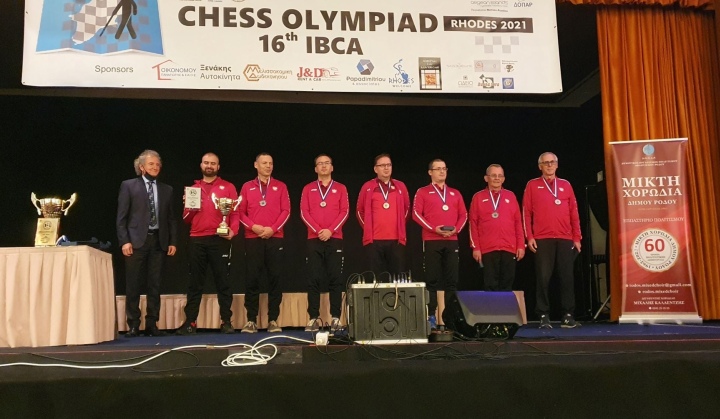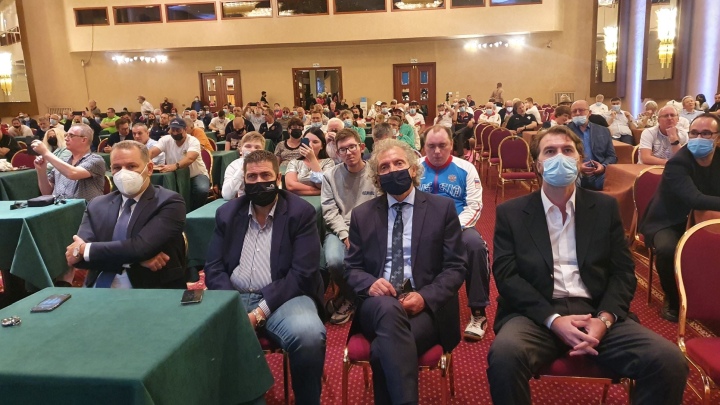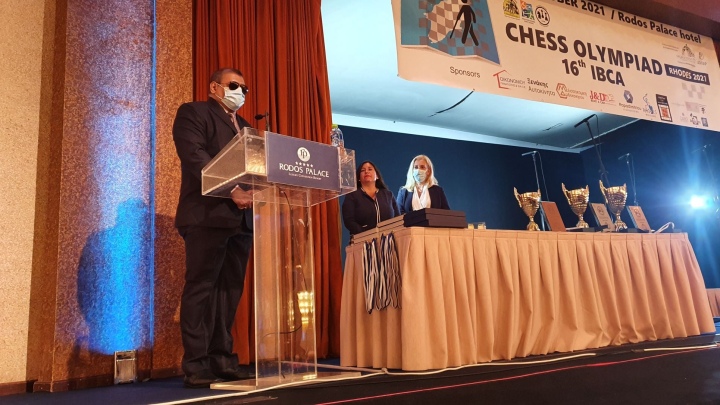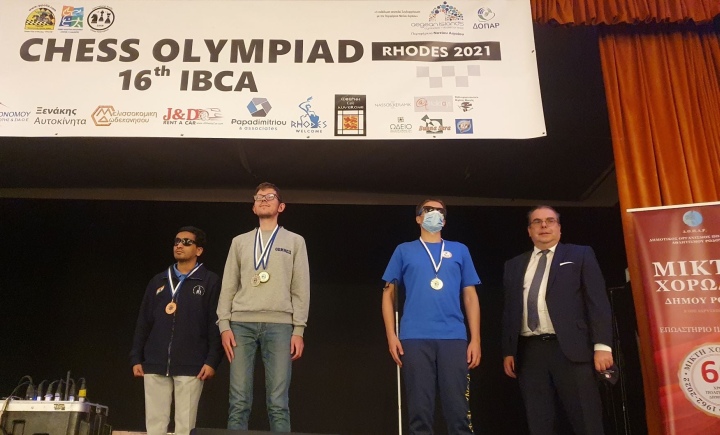The 16th Chess Olympiad for the Blind and Visually Impaired, organized under the auspices of the International Braille Chess Association (IBCA), took place in Rhodes, Greece, from October 16-26, 2021, as part of the 2021 Rhodes Chess Festival. Despite the difficulties presented by the Covid-19 pandemic, the Olympiad was well-attended and featured teams from twenty-two countries on three continents, including, for the first time in the IBCA history, Team Canada-Québec that became the only one to make an exhausting and dangerous journey from the Americas.
The Olympiad for the Blind and Visually Impaired was a nine-round Swiss team tournament under the FIDE Olympiad rules. Each team featured four players and one reserve. A remarkable new sports record was set by Team Russia that won all its nine matches and became the champion scoring 18 match points. The silver medals (14 match points) went to team Poland thanks to better tiebreaks over team Serbia which earned bronze.

The closing ceremony on October 26th became a massive celebration for Braille players and their supporters. Non-seeing players, their accompanying guides (human and canine), captains, coaches, officials, and spectators gathered in the sumptuous Jupiter Hall of the Rodos Palace Hotel, adorned with Greek national motifs. A real constellation of dignitaries attended the ceremony, including Mr Nikos Nikolis, Vice Governor of the Region of South Aegean, responsible for sports; Mr Giannis Papas, Member of the Parliament of Greece; Mr Antonis Kambourakis, Mayor of the Rhodes municipality; Mr, Stefanos Fasias, Vice-President of the Hellenic Sports Federation for Persons with Disabilities; Mr Efstathios Efstathopoulos, President of the Greek Chess Federation; Dr. Charudatta Jadhav, the IBCA President, and the newly elected members of the IBCA Presidential Board.
In his opening speech, Mayor Kambourakis reminded that the IBCA Olympiad was one of five constituent events of the Rhodes 2021 Chess Festival, along with the 2021 FIDE World Amateur Chess Championship, the 44th World Chess Solving Competition, and two Congresses. Greece became one of the pioneers in reopening chess life after the pandemic. The strategic thinking of Greek national and regional authorities, the excellent collaboration between FIDE, the IBCA, the WFCC, the organizers and local authorities made it possible for over three hundred participants from more than fifty countries to meet in person and enjoy chess. The people of Rhodes Island opened their hearts and minds to everyone. They especially welcomed the non-seeing players, displaying courtesy and friendliness that made the stay of people with disabilities especially enjoyable and memorable.

An extended address by the IBCA President Dr Charudatta Jadhav summarized new achievements of the Braille chess community. He remarked that the 16th Olympiad Chess Olympiad for the Blind and Visually Impaired was a complete success and a remarkable achievement for players, officials and organizers, made possible with the unparallel hospitality of Rhodes and its people.
Non-seeing players demonstrated bravery, focus, discipline and a high level of maturity. Everyone showed fair play and good sportsmanship. The strongest teams and the strongest players won their matches and games in an exemplary manner.
Dr Jadhav thanked the Chief Arbiter and the Deputy Chief Arbiter for their excellent work. They always acted in the best interests of the competition and ensured the best conditions for the players with disabilities. The CA and the DCA also generously used their considerable skills in Braille chess arbitering to train a cadre of local arbiters in the intricacies of these specialized competitions, thus ensuring cohesiveness and excellent functioning of the arbiter team for the tournament with challenging time control.
The IBCA President reminded that the quadrennial IBCA Congress was held during the Olympiad. The elections to the IBCA governing bodies achieved unprecedented diversity and gender balance. Congress adopted a new Constitution which strengthens the IBCA governance and makes the organization more democratic and transparent. The IBCA and its national members, the organizations, specifically established for the promotion of Braille chess for blind and visually impaired, work in harmony with respective countries’ governments, NGOs, national Paralympic Committees, FIDE, and other international associations as partners respecting each other’s core areas of expertise and advancing the goals set in the United Nations Convention on the Rights of Persons with Disabilities, the EU Charter of Fundamental Rights, and similar documents.

Dr Jadhav thanked the FIDE President, Mr Arkady Dvorkovich, for his personal attention to the needs of handicapped players and many new initiatives, such as the 2020 FIDE Online Olympiad for the Disabled and the 2020 FIDE Olympiad for the Disabled.
The IBCA President highlighted the record set by the Braille players from Russia at the Olympiad and stated that several lessons can be learned from Russia’s magnificent performance. It took two components to achieve such a remarkable feat: the bravery, skills and dedication of Russian players plus exemplary institutional support provided by the Russian state and chess authorities. Federal and regional authorities in Russia understand the needs of disabled people and view sports, including chess, as an essential tool for their full and effective participation and inclusion in society. The leadership of the Chess Federation of Russia supports visually impaired players organizationally, financially and morally, and celebrates their successes widely, which is evident from the personal congratulations sent by the CFR President to the IBCA Olympiad winners. Other countries would do well if they studied the Russian model of government, NGO, and public support to adjust to their national conditions.
The Vice-President of the Hellenic Sports Federation for Persons with Disabilities Mr Stefanos Fasias continued with the theme of the importance of government and societal support for players with disabilities and described the measures Greece takes in this direction.

The President of the Greek Chess Federation, Mr Efstathios Efstathopoulos mentioned the importance of all constituent events of the Rhodes Festival for chess life in Europe and worldwide and congratulated the players, organizers, officials, arbiters, and volunteers from all events on their dedication and excellent conduct of the events. It was a big challenge to hold competitions of such magnitudes while strictly adhering to the health measures and COVID-19 protocols, but all together, we did it!
The Rhodes Mixed Choir performed several oeuvres, including pieces by Greece’s national legend, the world-renowned composer Mikis Theodorakis.
Chief Arbiter Michail Keramiotis announced the official results in the team competition and the board prizes. The dignitaries presented the players and captains with medals, commemorative plaques, and trophies. The winners were met with huge applause. A national anthem of the Russian Federation was played.
At the end of the ceremony, Dr Jadhav called upon the blind and visually impaired players from all over the world to gather in Serbia for the next 17th IBCA Chess Olympiad in 2025.
The complete technical results of the event can be found here:
https://chess-results.com/tnr581993.aspx?lan=1&art=63&turdet=YES&flag=30
Information and photos by the IBCA press service

